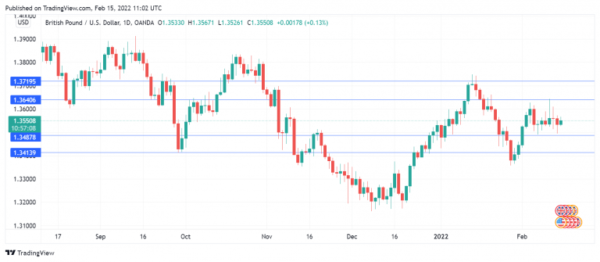Wage growth a warning sign for BoE
The UK employment report showed a slight rise in wage growth, raising fears of a wage-inflation spiral, as the country struggles with inflation at its highest level in 30 years.
Wage growth rose to 4.3% y/y in the three-month period to November, up from 4.2% beforehand. The upshot is that even though wage growth is rising, real wages are actually falling because inflation is running at a much higher clip than wage growth. The uptick, although not large, will put further pressure on the Bank of England to raise rates at the March meeting, which would mark back-to-back hikes.
Will the BOE show an aggressive side in the face of red-hot inflation? ING is projecting six rate hikes from the BoE this year. Similar to the Federal Reserve, the BoE has a credibility problem in as far as its handling of the inflation issue. In the case of the BoE, there is even a bigger disconnect with the market, after the central bank raised and then maintained rates late last year, both times catching the markets by surprise. Investors will be looking for some clarity from the BoE ahead of the March meeting and any comments from BoE members will be closely scrutinized.
The crisis on the Ukraine/Russia border remains a powder keg that could explode at any time. There are still hopes that a diplomatic solution can be reached and there have been reports of some Russian troops withdrawing from the border. The solution to the crisis is firmly in the hands of Russian President Vladimir Putin. The West has no intention of defending Ukraine militarily, so the key question is whether the threat of sanctions is enough to dissuade Putin from starting a war in Europe, which could have severe ramifications.
GBP/USD Technical Analysis
- There is resistance at 1.3640. and 1.3719
- There is support at 1.3487 and 1.3413

